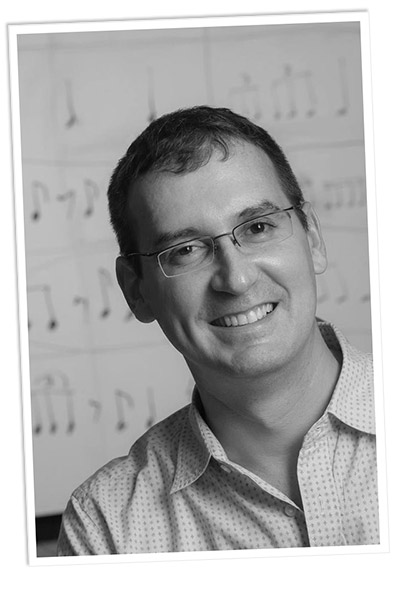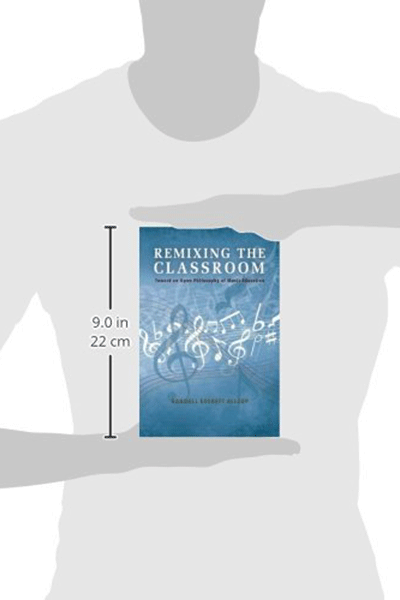Book
Allsup, R. E. (2016). Remixing the classroom: Toward an open philosophy of music education. Bloomington: Indiana University Press
Refereed Journal Articles
Allsup, R. E. (in press). Fractured (fairy) tales: In search of transformational spaces in music education. Bulletin of the Council on Research in Music Education.
Shieh, E. & Allsup, R. E. (2016). Fostering musical independence. Music Educators Journal, 102 (4): 30-35.
Allsup, R. E. & Lewis, J. (2015). A reappraisal of Bennett Reimer and his meanings of art. Philosophy of Music Education Review, 23 (2): 168-182.
Allsup, R. E. (2015). The eclipse of a higher education or problems preparing artists in a mercantile world. Music Education Review, 17 (3): 251-261.
Allsup, R. E. (2015). Music teacher quality and the problem of routine expertise. Philosophy of Music Education Review, 22 (1): 5-24.
Allsup, R. E. (2014). A place for music education in the humanities. Music Educators Journal, 100: 71-75.
Allsup, R. E. & Liu, C. (2013). A conversation between travelers: an expanding vision of music education. 旅人间的对话:扩展音乐教育的视野。Chinese Journal of Aesthetic Education, 4 (1), 1-7.
Allsup, R. E. (2012). The moral ends of band. Theory into Practice, 51 (3), 179-187.
Allsup, R. E. & Shieh, E. (2012). Social justice and music education: The call for a public pedagogy. Music Educators Journal, 98, 47-51.
Allsup, R. E. (2012). Music education and human flourishing: a meditation on democratic origins. British Journal of Music Education, 29 (2), 171-179.
Allsup, R. E. & Westerlund, H. (2012). Methods and situational ethics in music education. Action, Criticism, and Theory for Music Education, 11 (1), 124-48.
Allsup, R. E. (2011). Sequoias, mavericks, open doors . . . composing Joan Tower. Philosophy of Music Education Review, 19 (1), 24-36.
Allsup, R. E. (2011). Classical musicians and popular music: strategies and perspectives. Music Educators Journal, 97 (3), 30-34.
Allsup, R. E. (2010). On pluralism, inclusion, and musical citizenship. Nordic Research in Music Education, Yearbook 12, 135-155.
Reprinted by the Norwegian Academy of Music at: http://brage.bibsys.no/nmh/handle/URN:NBN:no-bibsys_brage_28451
Allsup, R. E. (2009). A conversation on the realities of music teaching: On the very pleasure of the unexpected and strange. Visions of Research in Music Education, 14, 1-3.
Allsup, R. E. (2009). Rough play: music and symbolic violence in an age of perpetual war. Action, Criticism, and Theory for Music Education, 8 (1), 35-53.
Allsup, R. E. & Benedict, C. (2008). The problems of band: An inquiry into the future of instrumental music education. Philosophy of Music Education Review, 16 (2), 156-173.
Allsup, R. E. (2008). Creating an educational framework for popular music in public schools: anticipating the second-wave. Visions of Research in Music Education, 12, 1-12.
Allsup, R. E. (2007). Extraordinary rendition: On politics, music, and circular meanings. Philosophy of Music Education Review, 15 (2), 144-154
Allsup, R. E. (2007). Democracy and one hundred years of music education. Music Educators Journal, 93 (5), 52-57.
Allsup, R. E. (2006). Species counterpoint: Darwin and the evolution of forms. Philosophy of Music Education Review, 14 (2), 159-174.
Allsup, R. E. (2005). Hard times: Philosophy and the fundamentalist imagination. Philosophy of Music Education Review,13 (2),139-142.
Allsup, R. E. & Baxter, M. (2004). Talking about music: Better questions? Better discussions!. Music Educators Journal, 91 (2), 29-33.
Allsup, R. E. (2004). Imagining possibilities in a global world: Music, learning, and rapid change. Music Education Research, 6 (2), 179-191.
Allsup, R. E. (2003). Praxis and the possible: Thoughts on the writings of Maxine Greene and Paulo Freire. Philosophy of Music Education Review, 11 (2), 157-169.
Allsup, R. E. (2003). Transformational education and critical pedagogy: Examining the link between culture and learning. Music Education Research, 5 (1), 5-12.
Allsup, R. E. (2003). Mutual learning and democratic action in instrumental music education. Journal of Research in Music Education, 51 (1), 24-37.
Allsup, R. E. (2001). Music education as liberatory practice: exploring the ideas of Milan Kundera. Philosophy of Music Education Review, 9 (2), 3-10.
Allsup, R. E. (1997). Activating self-transformation through improvisation in music teaching. Philosophy of Music Education Review 5 (2), 80-85.
Allsup, R. E. (1997). From Herscher to Harlem: A subjective account. Music Educators Journal, 83 (5), 33-36.
REPRINTED: Readings on Diversity, Inclusion, and Music for All, Reston, VA: MENC. [2003]
Non-refereed Journal Articles
Allsup, R. E. (2015). Another perspective: Our ‘both/and’ moment. Music Educators Journal. 102 (2): 85-86.
Allsup, R. E., (2011). Music teacher preparation and curriculum in Finland. School Music News, 75 (3), 50-51.
Allsup, R. E., (2005). Stress and the music teacher: Preventing burnout. Teaching Music, 12 (5), 50-54.
Allsup, R. E. (2005). The democratic band room: An alternative approach. Bluegrass Music News 57 (1), 22, 42-45.
Guest Editor
Finnish Journal of Music Education: Special Edition: Reconstructing, Revitalizing Traditions, Volume 13, No. 2, Fall 2010.
Editorial: “Revitalizing Traditions” pp. 6-7.
Music Education Research: Special Edition: Music Education, Equity, and Social Justice, Volume 9, No. 2, July 2007.
Editorial: “Music Education and Social Justice” pp. 167-168.
Book Chapters
Allsup, R. E. (2014). Epistemology and qualitative research in music education. In Conway, C. (Ed.), Oxford Handbook of Qualitative Research in American Music Education. New York: Oxford University Press. 57-75.
Allsup, R. E. (2013). The compositional turn in music education: From closed forms to open texts. In M. Kaschub and J. Smith (Ed.s), Composing Our Future: Preparing Music Educators to Teach Composition. Oxford & New York: Oxford University Press. 57-70.
Allsup, R. E. & Westerlund, H. (2012). Through simple discovery . . . Tanglewood II: Summoning the Future of Music Education. Chicago: Gia Publishers. 191-208.
Allsup, R. E., Westerlund, H., & Sheih, E. (2012). Youth culture in secondary education. In G. McPherson & G. Welch (Ed.s), The Oxford Handbook of Music Education. Oxford: Oxford University Press. 460-475.
Allsup, R. E. & Olson, N. (2012). New educational frameworks for popular music and informal learning: Anticipating the second-wave. In S. Karlsen & L. Väkevä (Ed.s), Future Prospects for Music Education: Corroborating Informal Learning Pedagogy. Cambridge, UK: Cambridge Scholars, 11-21.
Allsup, R. E. (2009). Philosophical perspectives in music education. In H. Abeles & L. Custodero (Ed.s), Critical Issues in Music Education: Contemporary Theory and Practice. New York & London: Oxford University Press, 39-60.
Allsup, R. E. (2009). Choosing music literature. In H. Abeles & L. Custodero (Ed.s), Critical Issues in Music Education: Contemporary Theory and Practice. New York & London: Oxford University Press, 215-235.
Allsup, R. E., Barnett, A. & Katz, E. (2006). Musical Heritage: Celebrating families through music. In C. Frierson-Campbell (Ed.), Music in the Urban Classroom, Vol 2: Teachers, Leaders, Partnerships, Reform. Reston, VA: MENC, 123-136.
Allsup, R. E. (2004). Of concert bands and garage bands: Creating democracy through popular music. In C. Rodriguez (Ed.), Bridging the Gap: Popular Music and Music Education. Reston, VI: MENC, 204-223.
Responses & Reviews
Allsup, R. E. (in press). Dissertation Review: “Johan Nyberg’s Music Education as an Adventure of Knowledge: Student and Teacher Experience as Conceptualizations of Musical Knowledge, Learning and Teaching.” Nordic Research in Music Education, Yearbook
Allsup, R. E. (2016). “The Enchanted Empire: An Essay Review of El Sistema Orchestrating Venezuela’s Youth by Geoffrey Baker” Music Education Review, 18 (3), 332-334.
Allsup, R. E. (2006). Book Review: Eric Prieto, “Listening In: Music, Mind, and the Modernist Narrative” (Lincoln, NE: University of Nebraska Press, 2002), Philosophy of Music Education Review, 14 (1), 93-97.
Allsup, R. E. (2005). The fifth element (or turning the dialectic on its head): A response to Estelle Jorgensen’s ‘Four philosophical models of relationship between theory and practice’. Philosophy of Music Education Review 13 (1), 104-107.
Allsup, R. E. (2004). Book Review: MacDonald, Hargreaves & Miell, “Musical Identities” (New York: Oxford University Press, 2002) in Music Education Research, 6 (1), 129-133.
Allsup, R. E. (2001). Review of RIME Conference, April 3-7, 2001, University of Exeter, UK, Music Education Research 3 (2), 255-256.
Dissertation
Allsup, R. E. (2009). 音樂互助学習与民主行為 (trans. Guo, Shengjian) Changsha, China: Hunan Normal University Press. (New preface in English and Chinese).
Allsup, R. E. (2002). Crossing over: Mutual learning and democratic action in instrumental music education. Abstracts International, Teachers College Columbia University, New York, NY.
 Randall Everett Allsup, Ed.D. is Associate Professor of Music and Music Education at Teachers College Columbia University in the City of New York. He holds a dual appointment as Professor of Music Education at the Arts College of Xiamen University, Xiamen City, Fujian Province, China. Randall earned degrees in music performance and music education from Northwestern University and Columbia University. His doctoral thesis, Crossing Over: Mutual Learning and Democratic Action in Instrumental Music Education was awarded “Outstanding Dissertation of the Year” by the Council on Research in Music Education. In 2009, he was awarded a Fulbright grant to teach and conduct research at the Sibelius Academy, Helsinki, Finland. Randall is the recipient of the Outstanding Teaching Award at Teachers College.
Randall Everett Allsup, Ed.D. is Associate Professor of Music and Music Education at Teachers College Columbia University in the City of New York. He holds a dual appointment as Professor of Music Education at the Arts College of Xiamen University, Xiamen City, Fujian Province, China. Randall earned degrees in music performance and music education from Northwestern University and Columbia University. His doctoral thesis, Crossing Over: Mutual Learning and Democratic Action in Instrumental Music Education was awarded “Outstanding Dissertation of the Year” by the Council on Research in Music Education. In 2009, he was awarded a Fulbright grant to teach and conduct research at the Sibelius Academy, Helsinki, Finland. Randall is the recipient of the Outstanding Teaching Award at Teachers College.






